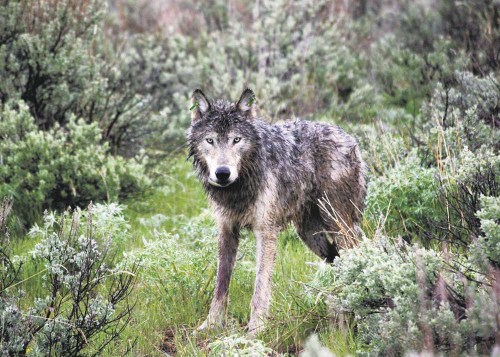Officials confirm wolves attacked eight cattle in NE Oregon
Published 7:00 am Friday, October 1, 2021

- The Umatilla County Board Of Commissioners considers approving more than $24,000 in grants for wolf depredation when it meets Wednesday, Feb. 2, 2022.
UKIAH — The Oregon Department of Fish and Wildlife confirmed wolves recently attacked eight cattle in the Ukiah Valley south of Pendleton, though it remains unclear which pack is responsible.
The first report came on Sept. 25, when a ranch hand discovered one dead and six injured calves in an approximately 200-acre private pasture. All were about six months old, weighing between 450 and 550 pounds. Two of the injured calves later were euthanized.
Three days later, another calf was found dead in the same pasture. In each case, the animals had bite marks suggesting they were alive when a predator attacked them The injuries included tooth scrapes, punctures and tears that were consistent with wolves.
While ODFW has chalked up the depredations to wolves, the agency does not know which pack caused the injuries.
The Ukiah pack, which roams parts of southern Umatilla and Union counties, was not in the area, according to GPS collar data. ODFW is now monitoring the Fivemile pack west of Ukiah to see if it is in areas outside its known territory.
In addition, the agency says a new group of wolves may be present southeast of the depredation location.
Rodger Huffman, a Union County rancher and co-chairman of the Oregon Cattlemen’s Association wolf committee, said both the organization and the producer are asking Fish and Wildlife to kill members of the offending pack to deter further wolf-livestock conflicts in the area.
Under the state’s Wolf Conservation and Management Plan, wolves in Eastern Oregon may be subject to lethal control if they have two confirmed depredations within nine months.
Twice this year, ODFW authorized a permit to kill wolves from the Lookout Mountain pack in Baker County following repeated attacks on livestock.
The agency shot two wolf pups from the Lookout Mountain pack in August, and then three more wolves — including the alpha male — in September after depredations did not stop.
Still, Huffman said ranchers have remained frustrated with the state’s management of wolves. He said the number of depredations confirmed by the agency is lower than the actual number producers face.
“We have a wolf management and conservation plan, and conservation has clearly been the first and highest priority,” Huffman said. “We’re just asking very respectfully that at least management be 50% of the equation in this.”
Environmental groups, on the other hand, staunchly oppose killing wolves and continue to fight to overturn the federal government’s decision to take wolves off the list of endangered species.
On Sept. 15, the Biden administration announced it would review the status of gray wolves in the northern Rocky Mountains, which could potentially restore endangered species protections in Idaho, Montana, Wyoming and the eastern one-third of Oregon and Washington.
Oregon’s minimum known wolf population is 173 as of the most recent count at the end of 2020.





